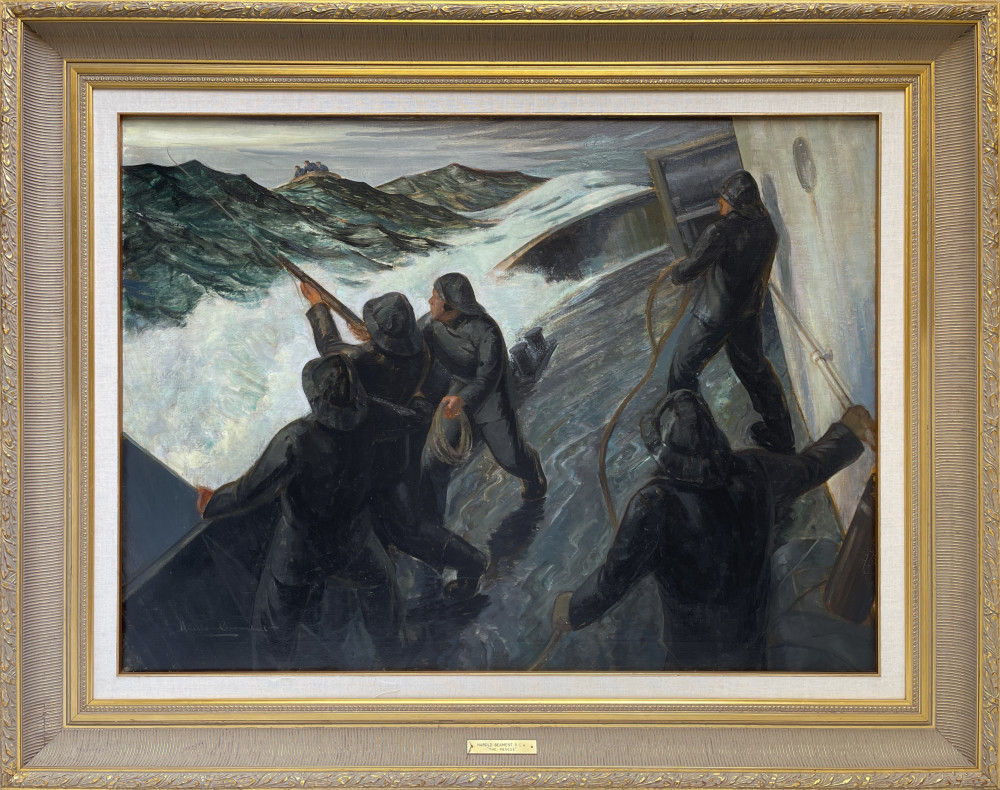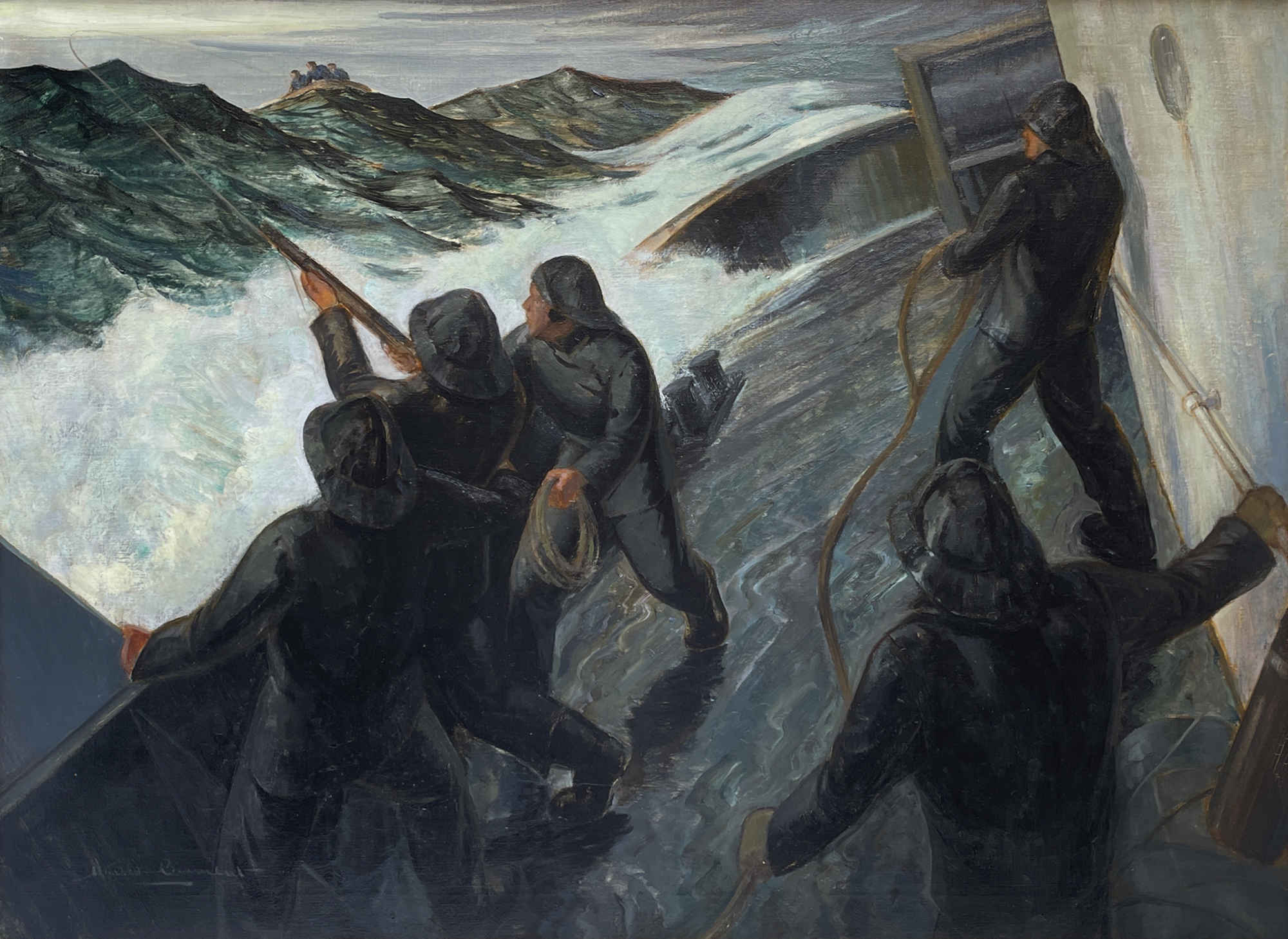Notable Sales
Rescue-Firing a Coston Gun Line, 1944 (circa)
Oil on canvas
27 x 36 in
68.6 x 91.4 cm
68.6 x 91.4 cm
Sold
Inscriptions
signed, ‘Harold Beament’ (lower left)Provenance
Galerie Walter Klinkhoff Inc., Montreal;
Acquired from the above by the present owner.
Exhibitions
Montreal, Art Association of Montreal, Royal Canadian Academy of the Arts Sixty-sixth Annual Exhibition, 2 Nov-2 Dec, 1945 as #12 “Rescued”, $450
"Rescue-Firing a Coston Gun Line" painted by Harold Beament around 1944. It would appear appropriate to paste in the description of an almost identical twin, a work slightly smaller in size, a painting in the War Museum. They write;
“Beament, an experienced mariner and official war artist, often depicted the perils of naval service. In this scene, sailors fire a rescue line to two people in a small raft (upper left). Note the angle of the ship's deck and the curve of the rescue line being fired into a heavy wind. Many of Beament's works explore the thin line between life and death at sea. Some, including this one, convey a sense of hope against long odds; others reflect the stark certainty of tragic loss [1]”. Another comment or observation of interest, we uncovered while researching this Beament worthy of adding is that, “Sustaining creativity within an inhospitable environment while battling the tedium of long and rolling ocean crossings...[2]” were challenges confronted by Navy war artists quite different from artists working in the Army and Air Force.
_________________________________
Harold Beament (1898-1985)
In his youth in Ottawa Beament served in the Naval Reserve. Beament was in the Royal Navy during World War l rising to the rank of Warrant Officer. Following the war he studied Law at Osgoode Hall and was admitted to the Ontario Bar in 1923. He practised for only one year after which he left that profession to pursue art studies at the Ontario College of Art. He then continued a career as both a commercial artist and art teacher. Beament taught at the school at the Montreal Museum of Fine Arts from 1936. Beament exhibited annually, with rare exception, from 1924 until 1953 at Royal Canadian Academy exhibitions and only slightly less regularly at the Art Association of Montreal shows. “The Rescue” was exhibited at the AAM in 1945 under the title “Rescued”.
In 1974, legendary Montreal art dealer William Watson in his Recollections, wrote of the years after 1932 when he relocated his gallery up to Sherbrooke Street to an address literally next door to where today Galerie Alan Klinkhoff is located: “[O]ne of the artists whose work we consistently showed during these years was Harold Beament. He is still one of my oldest friends- an artist, sailor, bon vivant, and humorist. We both know the difference between a knot and a mile. Harold served in the navy in two world wars, and was eventually my senior in rank although junior in age. I suspect that he had a better time of it in the first world war when he was a warrant officer . In the second, he had command of a ship on the cold North Atlantic patrol. I received a letter from him written at sea somewhere north of Halifax, expressing his feelings that it was ‘a young man’s war’ After nearly three years of active service among mine sweepers and escort vessels, he was appointed senior naval war artist [3]”. Watson himself had been in the Navy in WW l when he became Lieutenant W.E. Watson. During his service he invented “a submarine direction finder [4]”.
Laing Gallery in Toronto had solo exhibitions of Harold Beament’s paintings. Of Beament, Blair wrote; “He was among the earlier artists to make trips to the Arctic, painting the Inuit fishing from their kayaks, seal hunts on the ice floes and other Arctic subjects. Harold and my father were good friends and the artist always came to Toronto for his exhibition openings [5]”.
_________________________________
Footnotes:
1. "Painting, Rescue - Firing A Coston Gun Line", Canadian War Museum, Accessed January 24, 2021, https://www.warmuseum.ca/collections/artifact/1016291/
2. Pat Jessup. "Naval Art Of The Second World War", Government of Canada, Accessed January 25, 2021, https://www.canada.ca/en/navy/services/history/naval-service-1910-2010/naval-art-ww2.html
3. William R. Watson, Retrospective: Recollections of a Montreal Art Dealer (Toronto: University of Toronto Press, 1974), 59
4. Ibid., 21
5. Blair G. Laing, Memoirs of an Art Dealer, Vol. 2 (Toronto: McClelland and Stewart, 1979)
“Beament, an experienced mariner and official war artist, often depicted the perils of naval service. In this scene, sailors fire a rescue line to two people in a small raft (upper left). Note the angle of the ship's deck and the curve of the rescue line being fired into a heavy wind. Many of Beament's works explore the thin line between life and death at sea. Some, including this one, convey a sense of hope against long odds; others reflect the stark certainty of tragic loss [1]”. Another comment or observation of interest, we uncovered while researching this Beament worthy of adding is that, “Sustaining creativity within an inhospitable environment while battling the tedium of long and rolling ocean crossings...[2]” were challenges confronted by Navy war artists quite different from artists working in the Army and Air Force.
_________________________________
Harold Beament (1898-1985)
In his youth in Ottawa Beament served in the Naval Reserve. Beament was in the Royal Navy during World War l rising to the rank of Warrant Officer. Following the war he studied Law at Osgoode Hall and was admitted to the Ontario Bar in 1923. He practised for only one year after which he left that profession to pursue art studies at the Ontario College of Art. He then continued a career as both a commercial artist and art teacher. Beament taught at the school at the Montreal Museum of Fine Arts from 1936. Beament exhibited annually, with rare exception, from 1924 until 1953 at Royal Canadian Academy exhibitions and only slightly less regularly at the Art Association of Montreal shows. “The Rescue” was exhibited at the AAM in 1945 under the title “Rescued”.
In 1974, legendary Montreal art dealer William Watson in his Recollections, wrote of the years after 1932 when he relocated his gallery up to Sherbrooke Street to an address literally next door to where today Galerie Alan Klinkhoff is located: “[O]ne of the artists whose work we consistently showed during these years was Harold Beament. He is still one of my oldest friends- an artist, sailor, bon vivant, and humorist. We both know the difference between a knot and a mile. Harold served in the navy in two world wars, and was eventually my senior in rank although junior in age. I suspect that he had a better time of it in the first world war when he was a warrant officer . In the second, he had command of a ship on the cold North Atlantic patrol. I received a letter from him written at sea somewhere north of Halifax, expressing his feelings that it was ‘a young man’s war’ After nearly three years of active service among mine sweepers and escort vessels, he was appointed senior naval war artist [3]”. Watson himself had been in the Navy in WW l when he became Lieutenant W.E. Watson. During his service he invented “a submarine direction finder [4]”.
Laing Gallery in Toronto had solo exhibitions of Harold Beament’s paintings. Of Beament, Blair wrote; “He was among the earlier artists to make trips to the Arctic, painting the Inuit fishing from their kayaks, seal hunts on the ice floes and other Arctic subjects. Harold and my father were good friends and the artist always came to Toronto for his exhibition openings [5]”.
_________________________________
Footnotes:
1. "Painting, Rescue - Firing A Coston Gun Line", Canadian War Museum, Accessed January 24, 2021, https://www.warmuseum.ca/collections/artifact/1016291/
2. Pat Jessup. "Naval Art Of The Second World War", Government of Canada, Accessed January 25, 2021, https://www.canada.ca/en/navy/services/history/naval-service-1910-2010/naval-art-ww2.html
3. William R. Watson, Retrospective: Recollections of a Montreal Art Dealer (Toronto: University of Toronto Press, 1974), 59
4. Ibid., 21
5. Blair G. Laing, Memoirs of an Art Dealer, Vol. 2 (Toronto: McClelland and Stewart, 1979)















